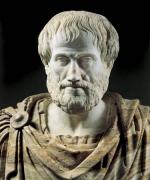|
This section contains 8,708 words (approx. 30 pages at 300 words per page) |

|
SOURCE: "The Question of Teleology," in An Approach to Aristotle's "Physics": With Particular Attention to the Role of His Manner of Writing, State University of New York Press, 1998, pp. 31-52.
In the following essay, Bolotin explores the teleological nature of Aristotle's Physics, examining in particular Aristotle's notion of final causality. Bolotin highlights some of the difficulties within Aristotle's arguments regarding natural purpose.
One of the complaints most often heard about Aristotle's physics is that it is teleological, i.e., based on the assumption that there are ends or purposes in nature, and that this assumption has been refuted by modern science. And yet even though this criticism has been widely accepted, the fact remains that modern science has not refuted teleology: it has not shown that there are no ends or purposes in nature, and, indeed, it has not even attempted to do so. What it has done...
|
This section contains 8,708 words (approx. 30 pages at 300 words per page) |

|


